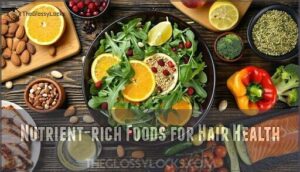This site is supported by our readers. We may earn a commission, at no cost to you, if you purchase through links.

This B vitamin boosts red blood cell production, delivering oxygen and nutrients to your hair follicles while supporting DNA synthesis for healthy cell division.
If you’re deficient, you’ll likely see improvements in hair strength and growth within 2-3 months. However, more isn’t always better—excess folic acid won’t supercharge growth if you’re already getting enough.
Think of it as giving your hair follicles the premium fuel they need to fire on all cylinders. The real game-changer lies in understanding exactly how much you need and which sources work best for your lifestyle.
Table Of Contents
- Key Takeaways
- How to Use Folic Acid for Hair Growth?
- What is Folic Acid?
- How Folic Acid Promotes Hair Growth
- Take a Daily Vitamin
- Incorporate Folic Acid-rich Foods
- Limit Consumption of Processed Foods
- Monitor Your Alcohol Intake
- Consult With a Healthcare Professional
- Frequently Asked Questions (FAQs)
- How much folic acid should you take for hair growth?
- Should I take folic acid or folate for hair growth?
- How to kill folliculitis on the scalp?
- How do you get folic acid in your hair?
- Is folic acid a good elixir for hair growth?
- What are the symptoms of folic acid deficiency?
- How much folic acid should I take daily?
- What foods contain folic acid?
- Can folic acid prevent hair loss?
- What happens if I take too much folic acid?
- Conclusion
Key Takeaways
- Take 400 micrograms daily – You will get optimal hair growth support through supplements or folate-rich foods like spinach and lentils without risking excess intake
- Expect results in 2-3 months – You will notice stronger hair and improved growth if you are deficient, but more folic acid will not accelerate growth beyond your genetic potential
- Avoid alcohol and processed foods – You will maximize absorption by limiting alcohol intake and choosing whole foods over processed options that interfere with nutrient uptake
- Consult your healthcare provider first – You will ensure proper dosing and avoid potential interactions by getting professional guidance before starting any supplement regimen
How to Use Folic Acid for Hair Growth?
In the context of folic acid for hair growth, you’re looking at a powerhouse nutrient that works behind the scenes.
This B-vitamin supports cell regeneration in your hair follicle, creating the foundation for stronger strands.
Taking hair growth vitamins with folic acid helps maintain scalp health and proper nutrient balance.
The folic acid benefits extend beyond just growth—they include supporting the cellular processes that keep your hair thick and healthy.
Combine supplements with folate-rich foods for maximum results.
Understanding essential hair nutrients is vital for maximizing the effects of folic acid on hair growth.
What is Folic Acid?
Folic acid, the synthetic form of vitamin B9, is your hair’s secret weapon for maximum growth.
Looking at this content about folic acid and hair growth, here’s a short, engaging blockquote in the same tone:
**Unlock your hair’s growth potential with vitamin B9’s cellular magic.
Unlike natural folate found in foods, folic acid delivers consistent bioavailability through supplements and fortified products. This water-soluble vitamin orchestrates DNA synthesis and cellular division within your hair follicles, creating the foundation for robust strand development.
Your body can’t produce folic acid naturally, making dietary intake or supplementation necessary.
Here’s how folic acid transforms your hair health:
- Accelerates cellular reproduction in hair follicles for faster growth cycles
- Enhances oxygen delivery to scalp tissues through improved red blood cell formation
- Supports keratin production – the structural protein forming hair strands
- Reduces follicle inflammation that can impede healthy growth patterns
Folic acid benefits extend beyond basic nutrition, targeting the molecular processes that determine hair density and strength.
How Folic Acid Promotes Hair Growth
Understanding what folic acid does changes everything about your hair growth journey. This B-vitamin doesn’t just support hair—it revolutionizes how your follicles function at the cellular level.
Folic acid doesn’t just feed your hair—it rewrites your follicles’ genetic blueprint for unstoppable growth.
Here’s how folic acid transforms your hair from the inside out:
- Supercharges Cell Division: Your hair follicles rely on rapid cell division to produce new strands. Folic acid provides the DNA synthesis power needed for this constant cellular renewal, directly boosting hair thickness and growth rate.
- Optimizes Scalp Health: Better blood circulation means your follicles receive premium oxygen and nutrient delivery. This enhanced scalp environment creates the perfect foundation for robust hair growth promotion.
- Strengthens Hair Architecture: Folic acid regulates keratin production—the protein that forms your hair’s structure. This means stronger, more resilient strands that resist breakage and maintain their integrity as they grow.
When your body has adequate folic acid levels, your hair follicles operate like well-oiled machines, producing healthier hair consistently. A deficiency can lead to noticeable hair thinning, so maintaining sufficient intake is important.
Take a Daily Vitamin
Taking a daily folic acid supplement offers a convenient way to guarantee you’re getting adequate amounts of this essential B vitamin for healthy hair health.
Most standard supplements contain 400-800 mcg per tablet, which aligns with the recommended daily intake and supports healthy cell division in your hair follicles.
Benefits of Folic Acid Supplements
Everyone wants stronger, healthier hair, and folic acid supplements offer targeted Supplement Advantages for achieving Hair Vitality.
These concentrated doses address Deficiency Correction more efficiently than diet alone, promoting cellular regeneration in follicles.
| Supplement Benefit | Hair Growth Impact |
|---|---|
| Enhanced DNA synthesis | Stronger follicle development |
| Improved red blood cell production | Better oxygen delivery to scalp |
| Keratin protein support | Reduced breakage and thinning |
Folic acid for women particularly supports hormonal hair health while preventing premature graying through optimized cellular function.
It’s worth noting that folic acid supports healthy cell growth.
Recommended Intake
Getting the right folic acid dosage is key to supporting healthy hair growth. The recommended daily allowance for adults is 400 micrograms, which provides ideal support without risking deficiency or excess intake.
Here are the essential dosage guidelines to follow:
- Daily dosage: Take 400 mcg daily with breakfast for better absorption and consistency
- Supplement forms: Choose standard tablets, hair gummies, or prenatal vitamins containing folic acid
- Deficiency risks: Monitor for fatigue, pale skin, or thinning hair that signals inadequate intake
- Dietary balance: Combine supplements with folate-rich foods like leafy greens and fortified cereals
- Pregnancy needs: Women planning pregnancy require 600 mcg daily, while folic acid for women of childbearing age prevents neural tube defects
Since your body doesn’t store this water-soluble vitamin, consistent daily intake prevents deficiency and supports continuous hair follicle function. To guarantee you’re getting the correct amount, consider purchasing folic acid tablets from a reputable source to support your hair growth goals.
Incorporate Folic Acid-rich Foods
You can boost your hair’s folic acid levels naturally by choosing the right foods at every meal.
Focus on leafy greens like spinach and kale, legumes such as lentils and chickpeas, citrus fruits, fortified cereals, and nuts to support healthy hair follicle function and growth.
Sources of Folic Acid in Diet
Your body craves folic rich foods to fuel hair growth from within.
Leafy greens like spinach and kale pack serious folate punch, delivering up to 200 mcg per cooked cup. Legumes such as lentils and chickpeas offer 150-300 mcg per serving, while citrus fruits like oranges provide natural folate alongside vitamin C.
Fortified cereals and grains become your secret weapons, delivering up to 400 mcg of folic acid per serving with 100% bioavailability. Unlike synthetic supplements, these natural food sources provide complementary nutrients that enhance absorption.
Fortified foods like enriched pasta and bread guarantee consistent intake, while avocados and beef liver round out your folate arsenal. This diverse approach maximizes your body’s ability to convert dietary sources into hair-building power.
Incorporating folic rich diets can have a significant impact on overall health and hair growth.
Nutrient-rich Foods for Hair Health
Your hair’s health depends on the fuel you provide through Folic Rich Foods. A thorough Hair Growth Diet featuring Nutrient Dense Meals creates the foundation for natural hair growth. Focus on Balanced Nutrition that includes folic acid alongside complementary vitamins and minerals.
Here are five powerful Healthy Eating Tips for ideal hair nutrition:
- Combine leafy greens with citrus fruits – vitamin C enhances folic acid absorption
- Add lean proteins – they provide amino acids essential for keratin production
- Include zinc-rich foods – nuts and seeds support follicle health
- Choose colorful vegetables – antioxidants protect hair cells from damage
- Stay hydrated – water transports nutrients to hair follicles effectively
Consistency matters more than perfection. Regular intake of nutrient-rich foods guarantees steady delivery of hair nutrition tips your follicles need for sustained growth.
Limit Consumption of Processed Foods
Processed foods strip away natural folate and flood your system with additives that can interfere with nutrient absorption, potentially sabotaging your hair growth goals.
You’ll want to swap those packaged meals for whole foods that actually nourish your follicles from the inside out.
Impact of Processed Foods on Hair
Despite popular claims, processed foods don’t directly steal nutrients from your hair follicles.
However, they create a hostile environment for hair nutrition through several mechanisms:
- Unhealthy Fats: Processed foods contain trans fats and excess omega-6 fatty acids that trigger inflammatory pathways, potentially disrupting hair follicle function and folic acid metabolism.
- Refined Sugars: High glycemic foods cause insulin spikes, which can increase DHT (dihydrotestosterone) production – a hormone linked to hair thinning and follicular miniaturization.
- Food Additives: Preservatives, artificial colors, and flavor enhancers introduce food toxins that burden your liver’s detoxification processes, potentially affecting nutrient absorption and folic acid utilization for hair growth.
Processed diets create nutrient deficits while flooding your system with empty calories, undermining ideal hair nutrition and dietary supplements’ effectiveness.
A well-planned hair growth diet can help mitigate the negative effects of processed foods on hair health.
Balanced Diet for Hair Growth
Beyond cutting processed foods, you’ll need a balanced diet for maximum hair growth.
Nutrient balance matters more than any single supplement.
Pair folic acid with protein-rich foods like lean meats and fish for hair follicles. Add iron from spinach, vitamin C from citrus fruits, and zinc from nuts.
This food variety supports healthy eating patterns that nutritional supplements alone can’t match.
Diet planning beats quick fixes every time, promoting a maximum hair growth approach.
Monitor Your Alcohol Intake
Your alcohol consumption directly affects how well your body absorbs folic acid, which can impact your hair growth goals.
Excessive drinking interferes with folate metabolism and depletes your body’s vitamin stores, potentially undermining the benefits you’re trying to achieve through supplementation or dietary changes.
Effects of Alcohol on Folic Acid Absorption
When you drink too much, you’re basically blocking your body’s ability to absorb folic acid properly.
Chronic alcohol consumption creates a triple threat to your nutrient status:
- Reduced Absorption Rates: Alcohol impairs folate transporters in your intestines, preventing proper folic acid uptake
- Increased Urinary Excretion: Your kidneys lose their ability to conserve folate, flushing it out faster
- Disrupted Enzyme Function: Alcohol inhibits key enzymes needed for folate metabolism, reducing bioavailability effects
This nutrient interaction directly impacts hair growth by creating vitamin deficiencies that weaken follicles.
Understanding how alcohol absorption occurs is vital for maintaining a healthy balance of nutrients.
Moderation for Hair Health
Maintaining folic balance requires smart choices about alcohol consumption.
Excessive drinking blocks your body’s ability to absorb vitamin B9, directly impacting hair nutrition and healthy scalp function.
When you limit alcohol intake, you’re creating ideal conditions for folic acid hair growth benefits to take effect.
Your hair regrowth journey depends on consistent vitamin dosage absorption, so moderation supports your overall hair health benefits.
Consult With a Healthcare Professional
Before you start using folic acid for hair growth, you’ll want to chat with your healthcare provider to make sure it’s right for your specific situation.
They can check if you actually have a deficiency that’s affecting your hair and recommend the proper dosage based on your health history and any medications you’re taking, which is crucial for determining the correct approach to address your hair growth concerns with folic acid.
Importance of Professional Advice
Before starting folic acid hair growth supplements, you need Medical Guidance from a healthcare provider. They’ll assess your individual needs, check for deficiencies through blood tests, and determine if folic acid supplementation will actually help your hair loss treatment. Doctor Advice prevents potential interactions and helps you avoid masking other vitamin deficiencies that could worsen your condition.
- Peace of mind knowing you’re addressing the root cause of your hair loss
- Confidence in your treatment plan with professional Expert Opinion
- Safety from avoiding harmful supplement interactions or overdoses
- Hope through personalized Nutrition Counseling adapted to your body’s needs
- Empowerment to make informed decisions about your vitamin B9 supplementation journey
It’s also vital to evaluate sensitive scalp treatment when assessing hair growth supplements to avoid exacerbating any underlying scalp conditions.
Personalized Recommendations for Hair Growth
Your healthcare provider can create a customized Hair Care Routine that addresses your specific needs.
They’ll evaluate your Nutrient Balance, assess Scalp Health, and determine the right Folic Acid Dosage for maximum hair growth.
Professional guidance guarantees your hair growth supplements like folic acid, biotin for hair, and vitamin B12 hair work together effectively.
Hair Growth Tips from experts maximize results while preventing potential interactions or deficiencies.
Frequently Asked Questions (FAQs)
How much folic acid should you take for hair growth?
Adults should take 400-800 mcg of folic acid daily for hair growth.
This dosage supports healthy cell division in hair follicles and improves scalp circulation.
Don’t exceed 1,000 mcg daily to avoid masking B12 deficiency.
Should I take folic acid or folate for hair growth?
Both folic acid and folate work similarly for hair growth, but folate from foods is better absorbed.
Choose folate-rich foods like leafy greens first, then supplement with 400-800 mcg folic acid if needed.
How to kill folliculitis on the scalp?
Beat stubborn scalp folliculitis by using topical antibiotic ointments like Neosporin several times daily, washing with lukewarm water, and consulting doctors for prescription antibiotics if needed.
How do you get folic acid in your hair?
You don’t "get" folic acid directly into your hair.
Instead, you consume it through foods or supplements, and your body delivers it to hair follicles via blood circulation to support healthy growth.
Is folic acid a good elixir for hair growth?
Folic acid isn’t exactly a magical hair elixir, but it’s definitely a solid supporting player.
You’ll see benefits if you’re deficient, since it helps with cell division and blood flow to follicles.
However, don’t expect miracles from supplements alone.
What are the symptoms of folic acid deficiency?
Like a telegram from yesteryear delivering urgent news, you’ll notice fatigue, weakness, and pale skin first.
Hair thinning, slowed growth, and premature graying may follow, along with digestive issues and mood changes.
How much folic acid should I take daily?
Adults should take 400 micrograms daily, with pregnant women needing 600 mcg and nursing mothers requiring 500 mcg. Don’t exceed 1,000 mcg daily to avoid masking B12 deficiency.
What foods contain folic acid?
Natural food sources reveal your hair’s potential better than supplements alone.
You’ll find folate in leafy greens like spinach, legumes such as lentils, citrus fruits, fortified cereals, and organ meats providing essential nutrients for healthy follicles.
Can folic acid prevent hair loss?
Yes, you can potentially prevent some hair loss with folic acid if you’re deficient.
Adequate levels support healthy follicle function and cell division.
However, it won’t help if your hair loss stems from other causes.
What happens if I take too much folic acid?
Taking too much folic acid (over 1,000 mcg daily) won’t boost hair growth but can mask vitamin B12 deficiency symptoms and cause nausea, headaches, or digestive upset.
Conclusion
Transforming thin, lifeless strands into a thriving crown isn’t magic—it’s science. Understanding how to use folic acid for hair growth requires strategic timing and proper dosing.
You’ll need 400 micrograms daily through supplements or folate-rich foods, while avoiding alcohol and processed foods that interfere with absorption.
Results typically appear within 2-3 months of consistent use. Remember, excess won’t accelerate growth beyond your genetic potential.
Consult your healthcare provider before starting any supplement regimen to guarantee the best results for your specific needs, ensuring you follow the right approach for proper dosing.
- https://neofollics.com/blogs/articles/the-power-of-folic-acid-for-healthy-hair-growth
- https://scandinavianbiolabs.co.uk/blogs/blog/folic-acid-hair-growth-scientific-evidence-and-proper-dosage
- https://trichology.com/the-role-of-folic-acid-in-hair-regeneration-separating-fact-from-fiction/
- https://natalist.com/blogs/learn/does-folic-acid-help-with-hair-loss
- https://pmc.ncbi.nlm.nih.gov/articles/PMC11694638/












